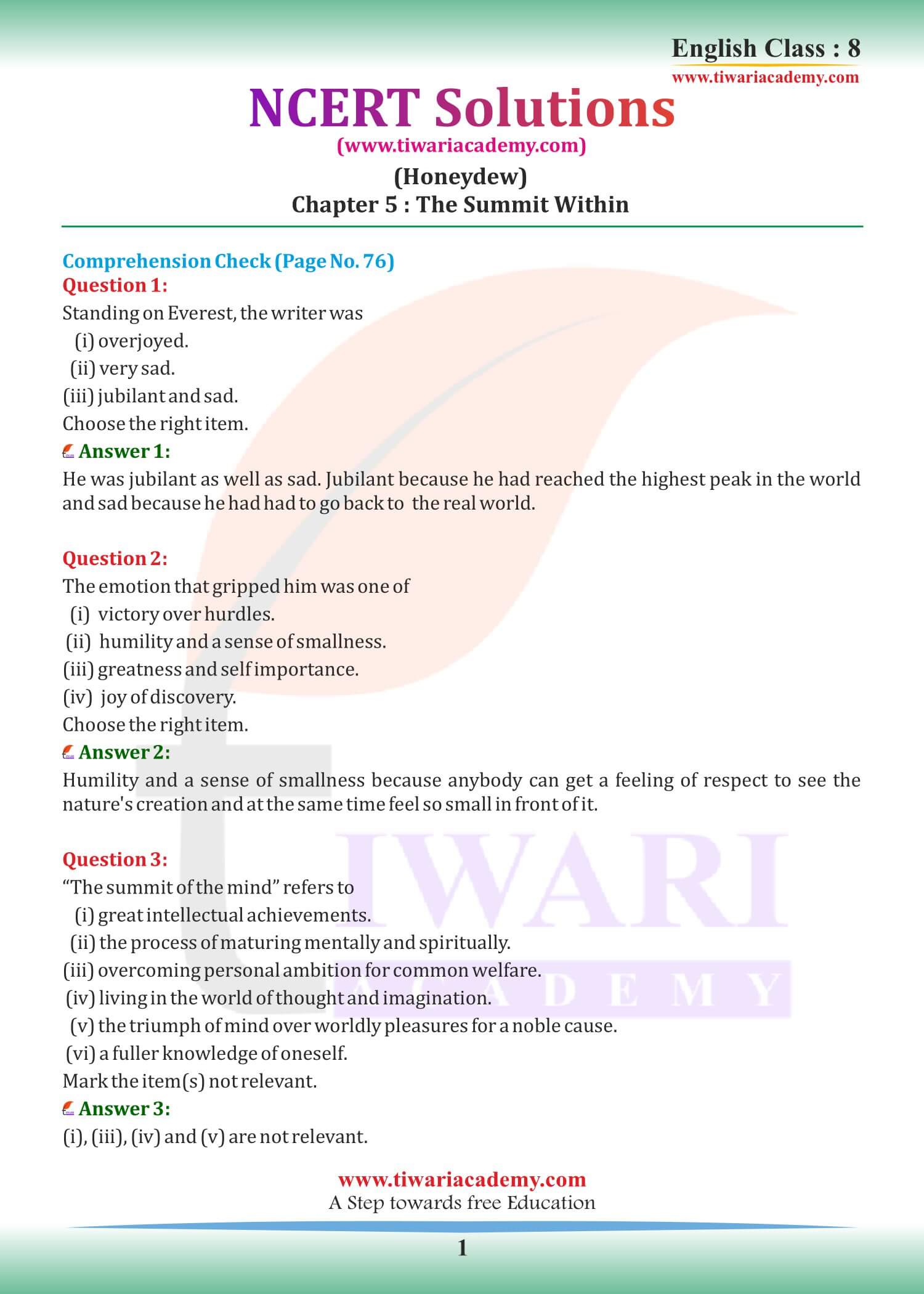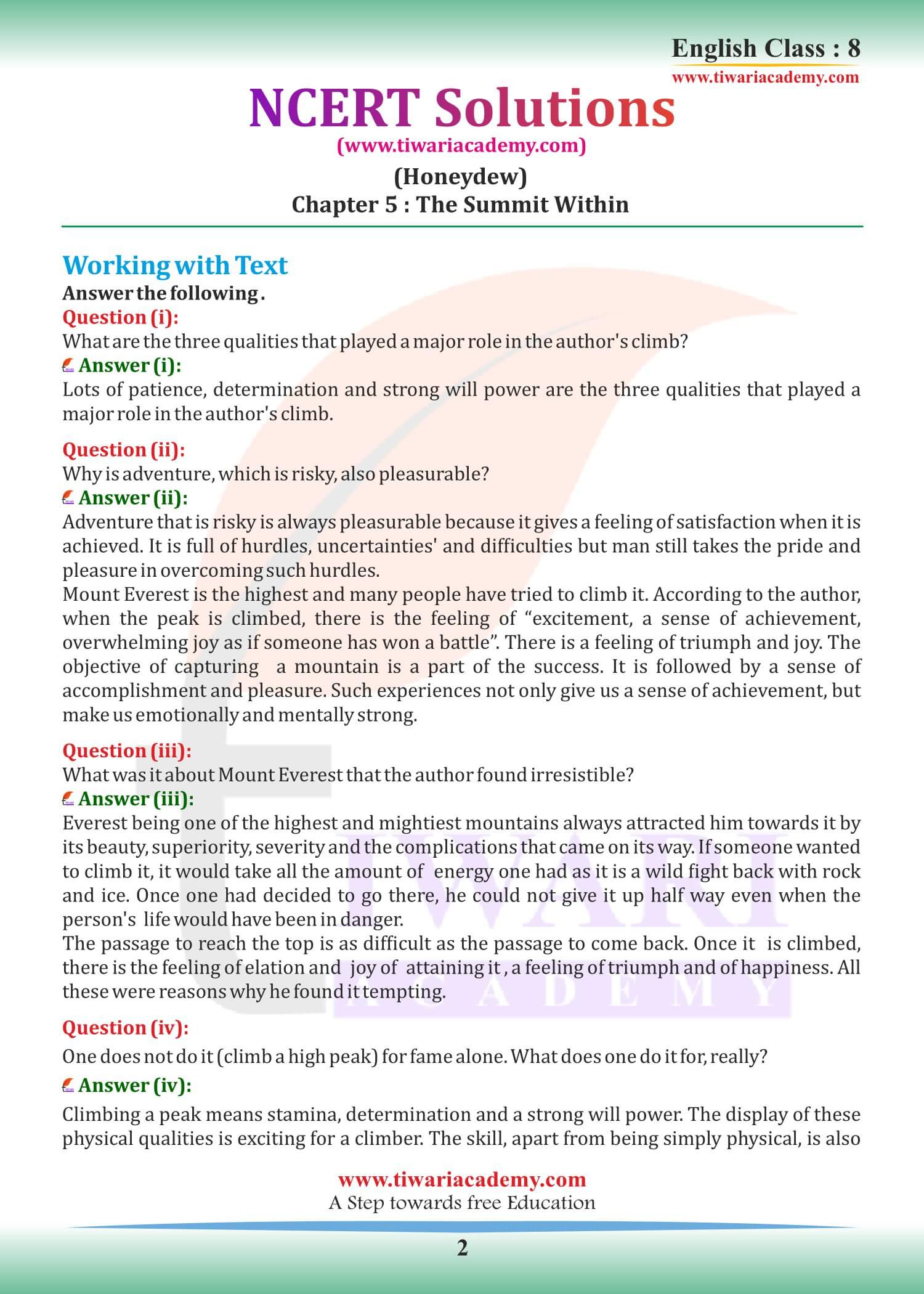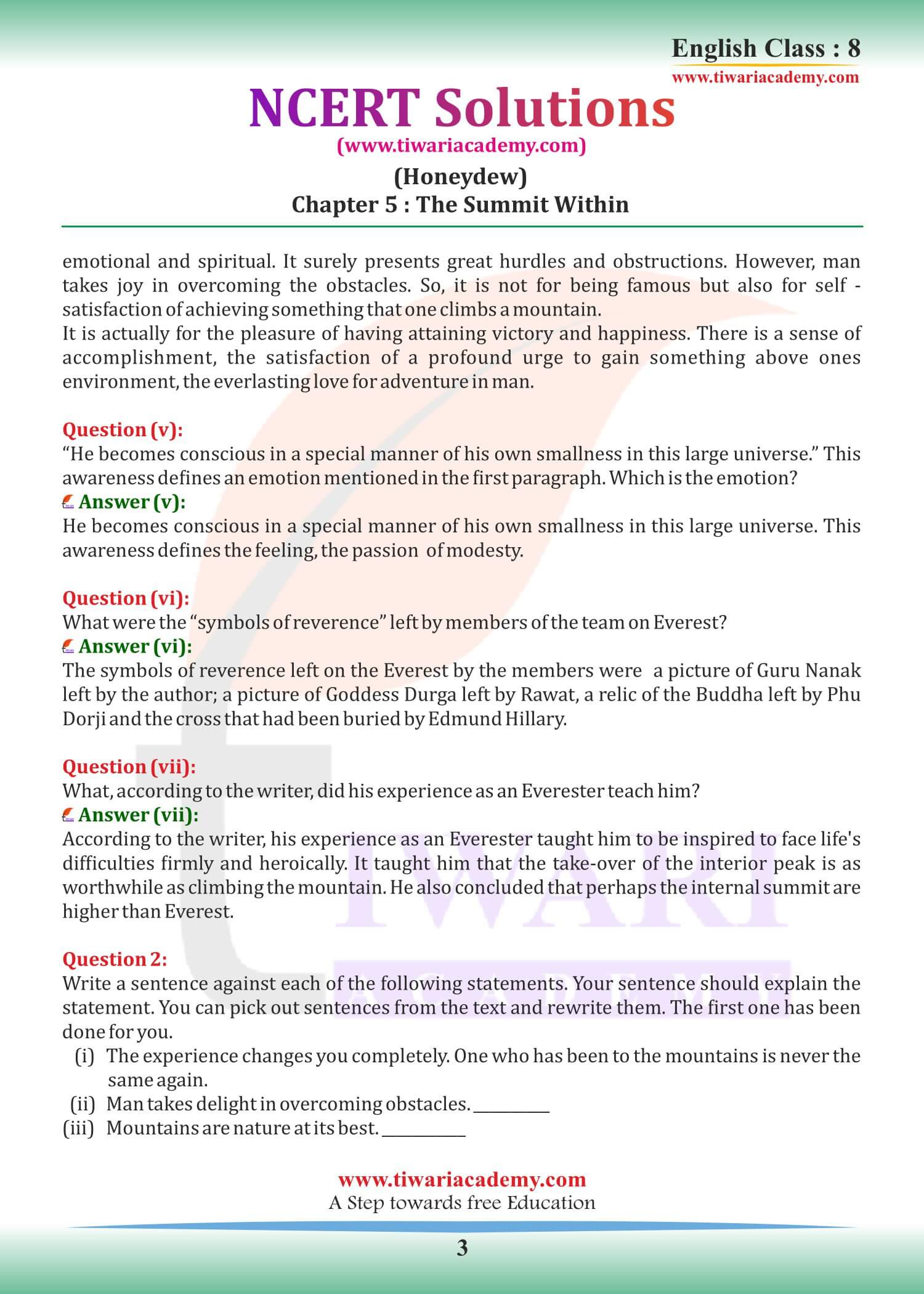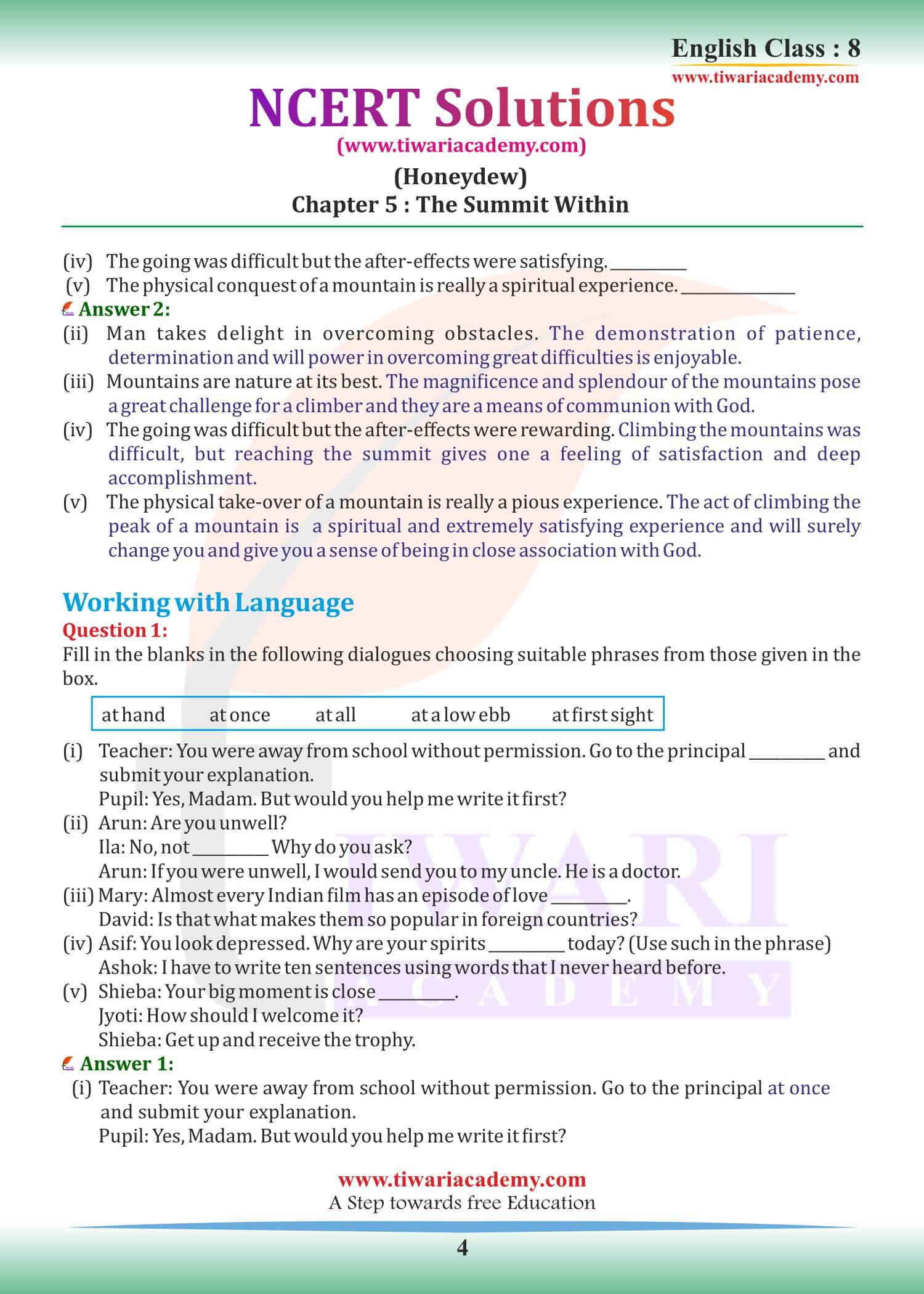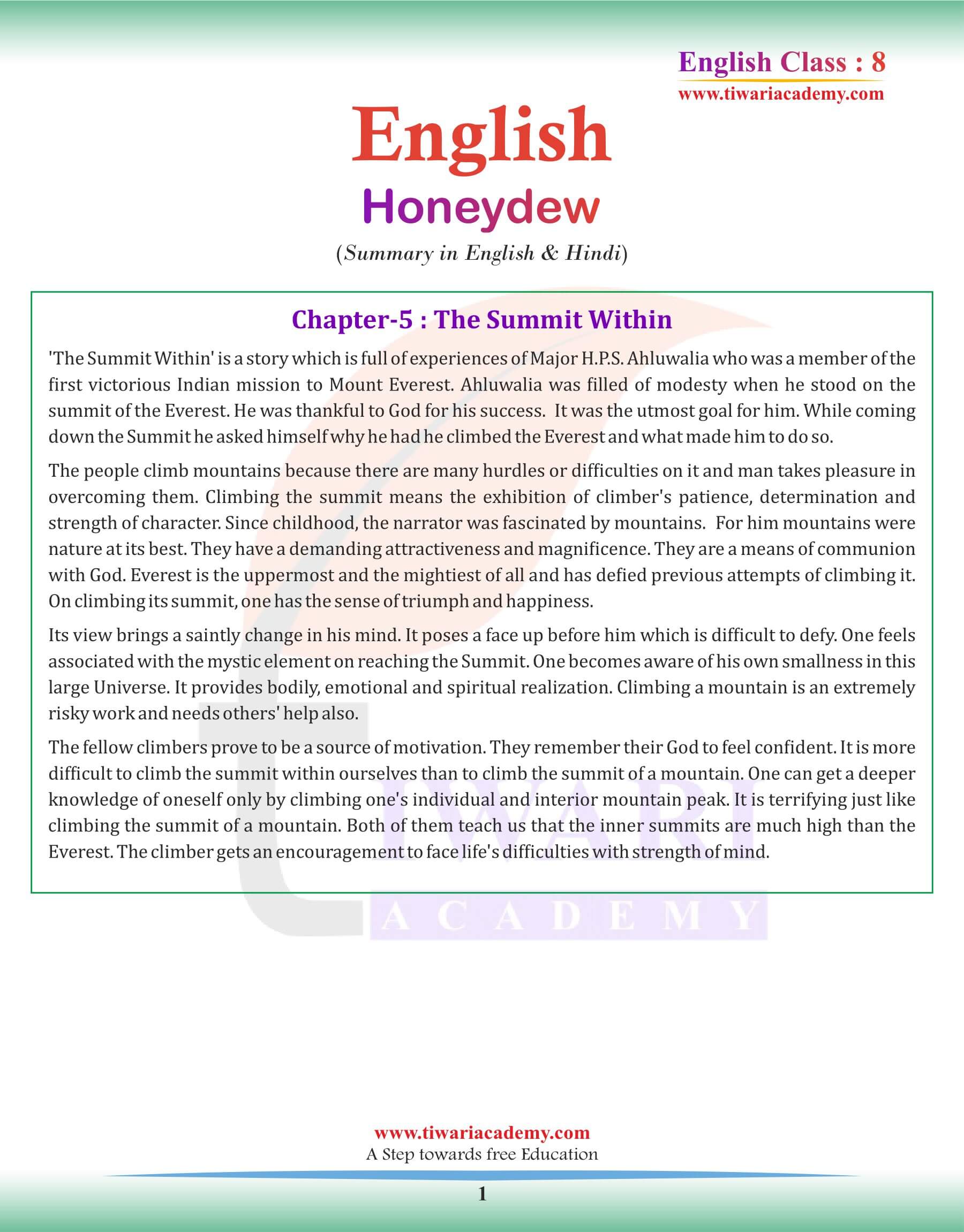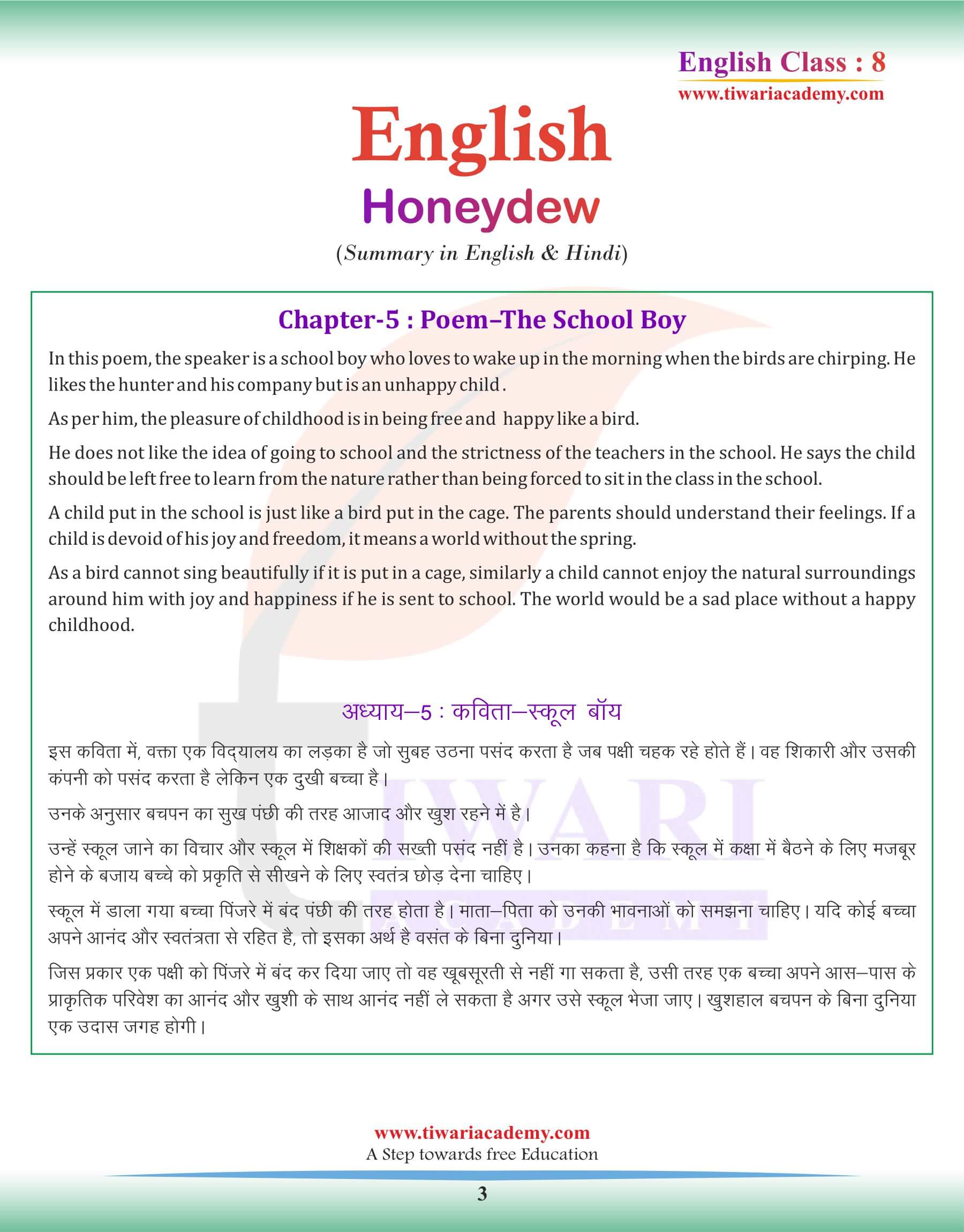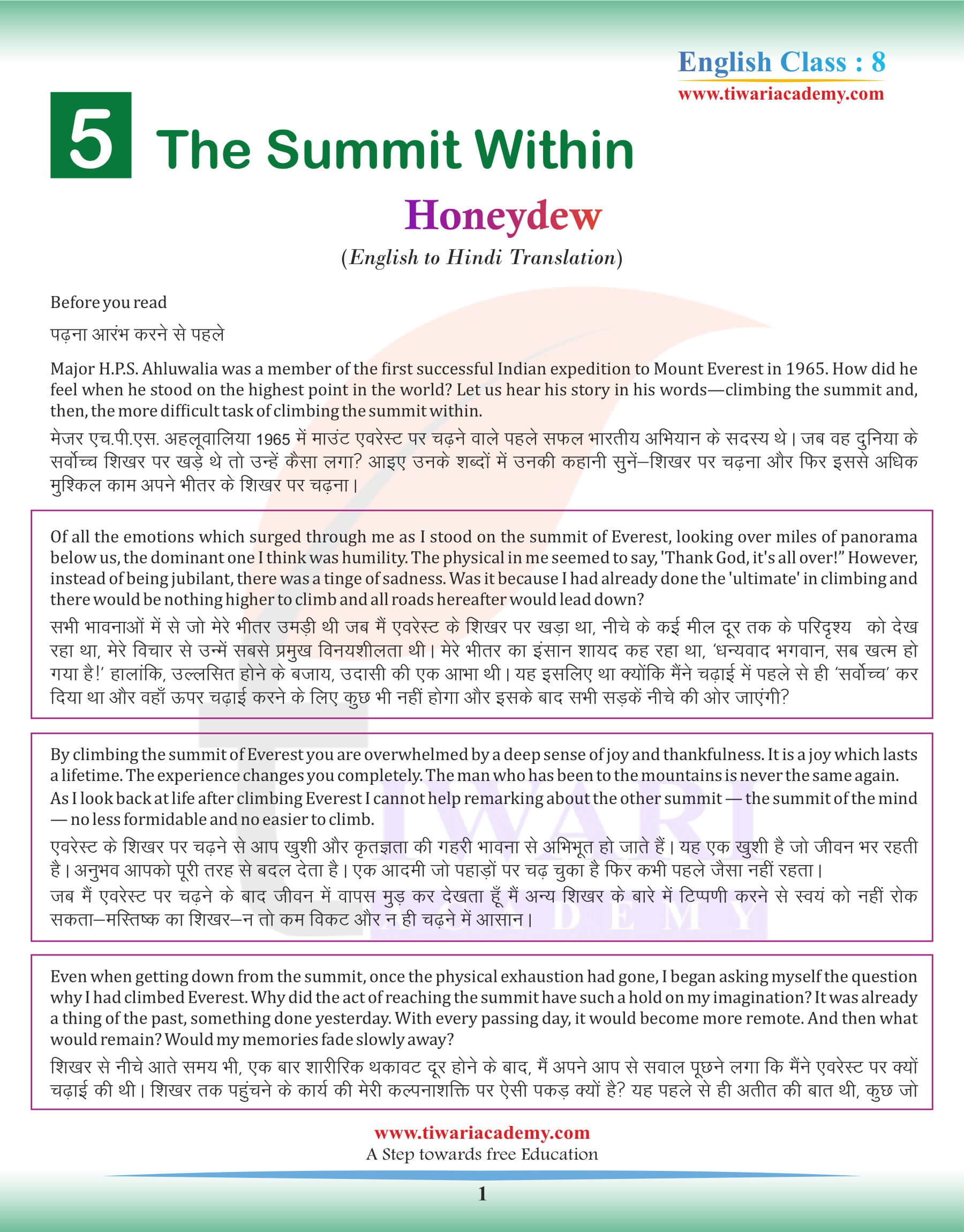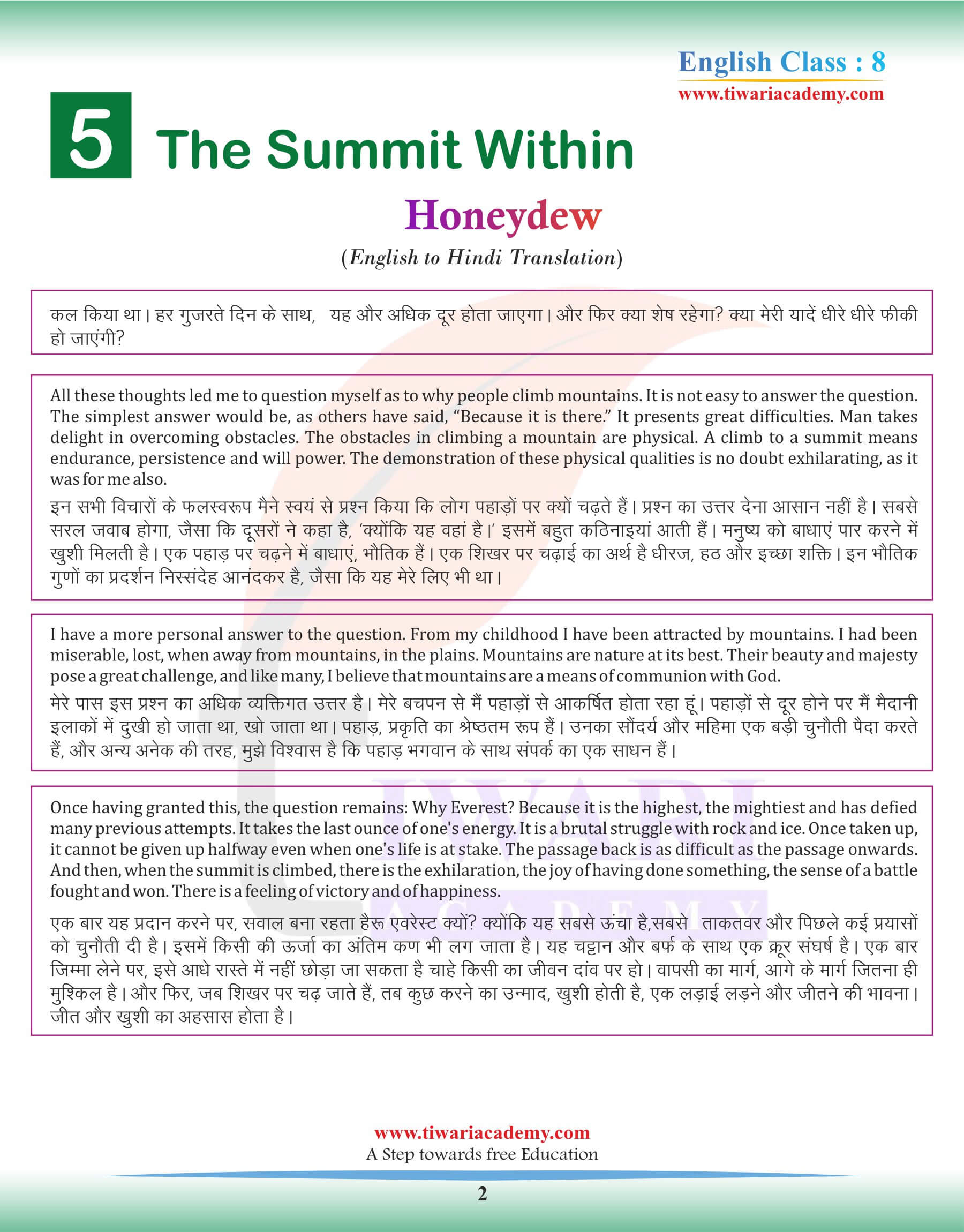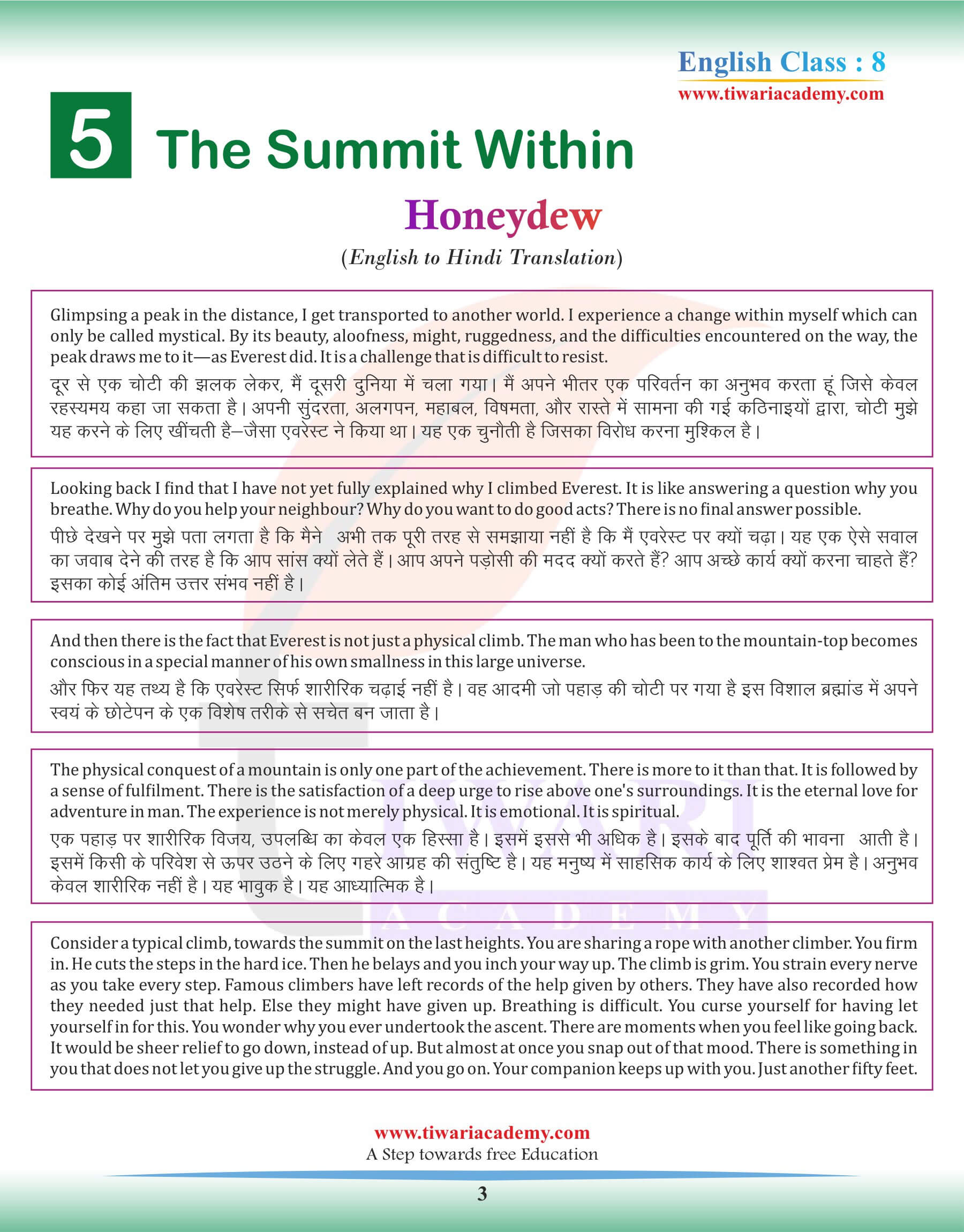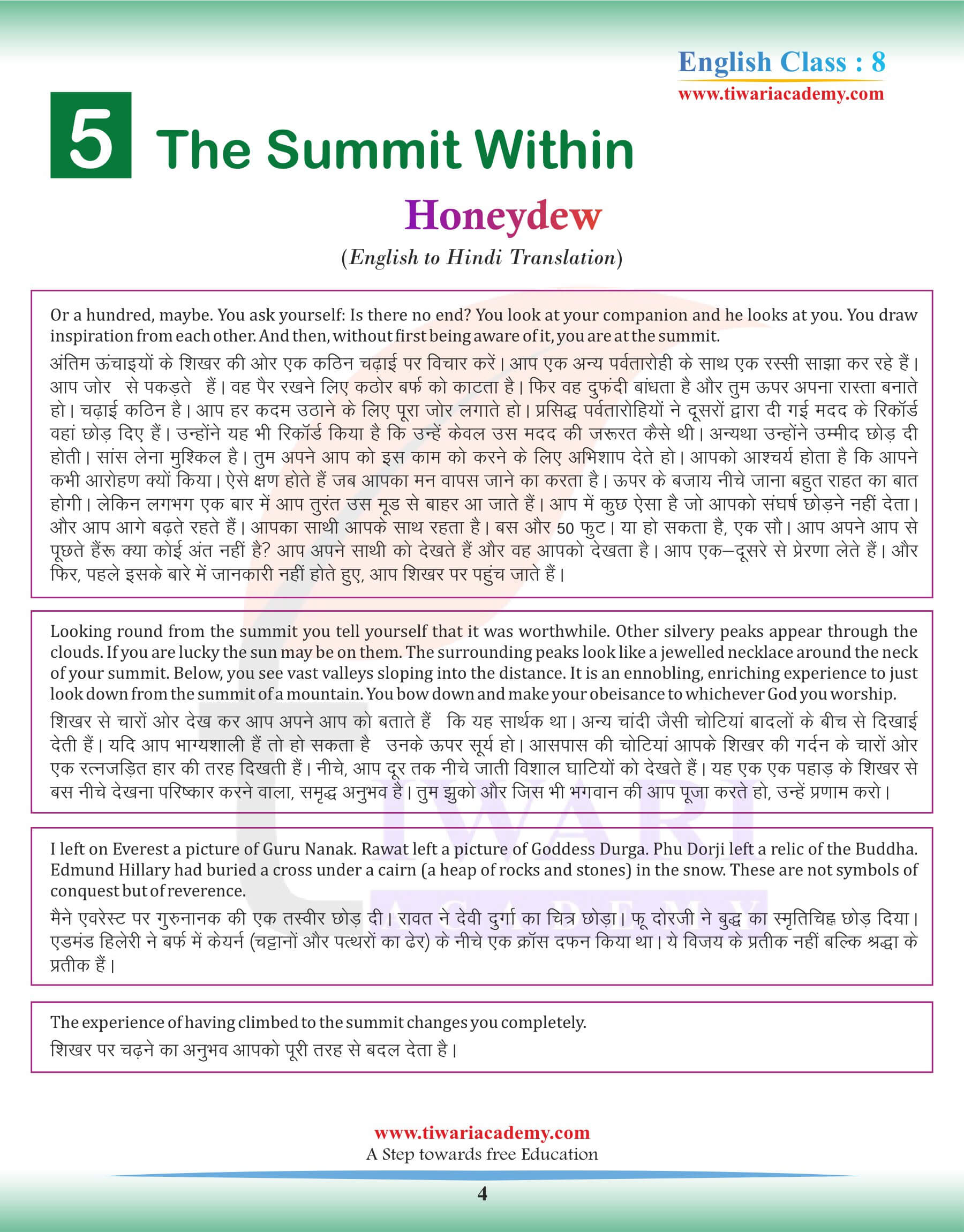NCERT Solutions for Class 8 English Honeydew Chapter 5 The Summit Within and Poem 5 The School Boy with Hindi Translation, Summary in English and Hindi revised for academic session 2024-25. All the question answers given in the chapter end exercises, comprehension check question answers, working with the text, working with the poem and grammar portions of 8th English Chapter 5 are based on rationalised NCERT books published for 2024-25 exams.
Class 8 English Honeydew Chapter 5 Question Answers
| Class: 8 | English |
| Textbook: | English Reader – Honeydew |
| Chapter: 5 | The Summit Within |
| Contents: | Translation, Summary and NCERT Solutions |
| Content Type: | Text, Images and Videos |
| Academic Session: | 2024-25 |
Comprehension Check on Page 79
Question 1
Standing on Everest, the writer was
(i) overjoyed.
(ii) very sad.
(iii) jubilant and sad.
Choose the right item.
Answer 1
(iii) jubilant and sad.
He was jubilant as well as sad. Jubilant because he had reached the highest peak in the world and sad because he had had to go back to the real world.
Question 2
The emotion that gripped him was one of
(i) victory over hurdles.
(ii) humility and a sense of smallness.
(iii) greatness and self importance.
(iv) joy of discovery.
Choose the right item.
Answer 2
(ii) humility and a sense of smallness.
Humility and a sense of smallness because anybody can get a feeling of respect to see the nature’s creation and at the same time feel so small in front of it.
Question 3
“The summit of the mind” refers to
(i) great intellectual achievements.
(ii) the process of maturing mentally and spiritually.
(iii) overcoming personal ambition for common welfare.
(iv) living in the world of thought and imagination.
(v) the triumph of mind over worldly pleasures for a noble cause.
(vi) a fuller knowledge of oneself.
Mark the item(s) not relevant.
Answer 3
(i), (iii), (iv) and (v) are not relevant.
Working with the Text
Lots of patience, determination and strong will power are the three qualities that played a major role in the author’s climb.
Why is adventure, which is risky, also pleasurable?
Adventure that is risky is always pleasurable because it gives a feeling of satisfaction when it is achieved. It is full of hurdles, uncertainties’ and difficulties but man still takes the pride and pleasure in overcoming such hurdles.
Mount Everest is the highest and many people have tried to climb it. According to the author, when the peak is climbed, there is the feeling of “excitement, a sense of achievement, overwhelming joy as if someone has won a battle”. There is a feeling of triumph and joy. The objective of capturing a mountain is a part of the success. It is followed by a sense of accomplishment and pleasure. Such experiences not only give us a sense of achievement, but make us emotionally and mentally strong.
Everest being one of the highest and mightiest mountains always attracted him towards it by its beauty, superiority, severity and the complications that came on its way. If someone wanted to climb it, it would take all the amount of energy one had as it is a wild fight back with rock and ice. Once one had decided to go there, he could not give it up half way even when the person’s life would have been in danger.
The passage to reach the top is as difficult as the passage to come back. Once it is climbed, there is the feeling of elation and joy of attaining it, a feeling of triumph and of happiness. All these were reasons why he found it tempting.
One does not do it (climb a high peak) for fame alone. What does one do it for, really?
Climbing a peak means stamina, determination and a strong will power. The display of these physical qualities is exciting for a climber. The skill, apart from being simply physical, is also emotional and spiritual. It surely presents great hurdles and obstructions. However, man takes joy in overcoming the obstacles. So, it is not for being famous but also for self -satisfaction of achieving something that one climbs a mountain.
It is actually for the pleasure of having attaining victory and happiness. There is a sense of accomplishment, the satisfaction of a profound urge to gain something above ones environment, the everlasting love for adventure in man.
“He becomes conscious in a special manner of his own smallness in this large universe.” This awareness defines an emotion mentioned in the first paragraph. Which is the emotion?
He becomes conscious in a special manner of his own smallness in this large universe. This awareness defines the feeling, the passion of modesty.
What were the “symbols of reverence” left by members of the team on Everest?
The symbols of reverence left on the Everest by the members were a picture of Guru Nanak left by the author; a picture of Goddess Durga left by Rawat, a relic of the Buddha left by Phu Dorji and the cross that had been buried by Edmund Hillary.
What, according to the writer, did his experience as an Everester teach him?
According to the writer, his experience as an Everester taught him to be inspired to face life’s difficulties firmly and heroically. It taught him that the take-over of the interior peak is as worthwhile as climbing the mountain. He also concluded that perhaps the internal summit is higher than Everest.
Working with the Text Question 2
Write a sentence against each of the following statements. Your sentence should explain the statement. You can pick out sentences from the text and rewrite them. The first one has been done for you.
(i) The experience changes you completely.
One who has been to the mountains is never the same again.
(ii) Man takes delight in overcoming obstacles.
_________________________________________
(iii) Mountains are nature at its best.
_________________________________________
(iv) The going was difficult but the after-effects were satisfying.
_________________________________________
(v) The physical conquest of a mountain is really a spiritual experience.
_________________________________________
Working with the Text Question 2
(ii) Man takes delight in overcoming obstacles. The demonstration of patience, determination and will power in overcoming great difficulties is enjoyable.
(iii) Mountains are nature at its best. The magnificence and splendour of the mountains pose a great challenge for a climber and they are a means of communion with God.
(iv) The going was difficult but the after-effects were rewarding. Climbing the mountains was difficult, but reaching the summit gives one a feeling of satisfaction and deep accomplishment.
(v) The physical take-over of a mountain is really a pious experience. The act of climbing the peak of a mountain is a spiritual and extremely satisfying experience and will surely change you and give you a sense of being in close association with God.
Working with the Language
Working with the Language Question 1
Fill in the blanks in the following dialogues choosing suitable phrases from those given in the box.
at hand at once at all at a low ebb at first sight
(i) Teacher: You were away from school without permission. Go to the principal ________________ and submit your explanation.
Pupil: Yes, Madam. But would you help me write it first?
(ii) Arun: Are you unwell?
Ila: No, not ________________ Why do you ask?
Arun: If you were unwell, I would send you to my uncle.
He is a doctor.
(iii) Mary: Almost every Indian film has an episode of love ________________.
David: Is that what makes them so popular in foreign countries?
(iv) Asif: You look depressed. Why are your spirits ________________ today?
(Use such in the phrase)
Ashok: I have to write ten sentences using words that I never heard before.
(v) Shieba: Your big moment is close ________________.
Jyoti: How should I welcome it?
Shieba: Get up and receive the trophy.
Working with the Language Answer 1
Teacher: You were away from school without permission. Go to the principal at once and submit your explanation.
Pupil: Yes, Madam. But would you help me write it first?
(ii) Arun: Are you unwell?
Ila: No, not at all. Why do you ask?
Arun: If you were unwell, I would send you to my uncle. He is a doctor.
(iii) Mary: Almost every Indian film has an episode of love at first sight.
David: Is that what makes them so popular in foreign countries?
(iv) Asif: You look depressed. Why are your spirits at such a low ebb today? (Use such in the phrase)
Ashok: I have to write ten sentences using words that I never heard before.
(v) Shieba: Your big moment is close at hand.
Jyoti: How should I welcome it?
Shieba: Get up and receive the trophy.
Working with the Language Question 2
Write the noun forms of the following words adding -ance or -ence to each.
(i) endure ________________
(ii) persist ________________
(iii) signify ________________
(iv) confide ________________
(v) maintain ________________
(vi) abhor ________________
Working with the Language Answer 2
(i) endure: endurance
(ii) persist: persistence
(iii) signify: significance
(iv) confide: confidence
(v) maintain: maintenance
(vi) abhor: abhorrence
Match words under A with their meanings under B.
| A | B |
|---|---|
| remote | difficult to overcome |
| means | most prominent |
| dominant | be overcome/overpowered |
| formidable | method(s) |
| overwhelmed | far away from |
| A | B |
|---|---|
| Remote | far away from |
| Means | Method(s) |
| Dominant | most prominent |
| Formidable | difficult to overcome |
| Overwhelmed | Be overcome/overpowered |
Working with the Language Question 3
Fill in the blanks in the sentences below with appropriate words from under A.
(a) There were ________________ obstacles on the way, but we reached our destination safely.
(b) We have no ________________ of finding out what happened there.
(c) Why he lives in a house ________________ from any town or village is more than I can tell.
(d) ________________ by gratitude, we bowed to the speaker for his valuable advice.
(e) The old castle stands in a ___________ position above the sleepy town.
Working with the Language Answer 3
(a) There were formidable obstacles on the way, but we reached our destination safely.
(b) We have no means of finding out what happened there.
(c) Why he lives in a house remote from any town or village is more than I can tell.
(d) Overwhelmed by gratitude, we bowed to the speaker for his valuable advice.
(e) The old castle stands in a dominant position above the sleepy town.
Working with the Poem
Find three or four words/phrases in stanza 1 that reflect the child’s happiness and joy.
The phrases that reflect the child’s joy and happiness are “love to rise in a summer morn”, “birds sing on every tree”, “the skylark sings with me”, and “sweet company”.
In stanza 2, the mood changes. Which words/phrases reflect the changed mood?
The phrases that reflect the changed mood are “it drives all joy away” and “spend the day in sighing and dismay”.
Working with the Poem Question 3
“A cruel eye outworn” (stanza 2) refers to
(i) the classroom which is shabby/noisy.
(ii) the lessons which are difficult/uninteresting.
(iii) the dull/uninspiring life at school with lots of work and no play.
Mark the Ans that you consider right.
Working with the Poem Answer 3
(iii) the dull/uninspiring life at school with lots of work and no play.
Working with the Poem Question 4
Nor sit in learning’s bower
Worn thro’ with the dreary shower
Which of the following is a close paraphrase of the lines above?
(i) Nor can I sit in a roofless classroom when it is raining.
(ii) Nor can I learn anything at school though teachers go on lecturing and explaining.
(iii) Nor can I sit in the school garden for fear of getting wet in the rain.
Working with the Poem Answer 4
(ii) Nor can I learn anything at school though teachers go on lecturing and explaining.
Reference to Context – 1
Of all the emotions which surged through me as I stood on the summit of Everest, looking over miles of the panorama below us, the dominant one I think was humility. The physical in me seemed to say, ‘Thank God, it’s all over!” However, instead of being jubilant, there was a tinge of sadness. Was it because I had already done the ‘ultimate’ in climbing and there would be nothing higher to climb and all roads hereafter would lead down? By climbing the summit of Everest you are overwhelmed by a deep sense of joy and thankfulness. It is a joy that lasts a lifetime. The experience changes you completely. The man who has been to the mountains is never the same again.
Answer the following questions:
- What emotion took over Major Ahluwalia when he reached the summit?
- Why was Major not that happy after conquering the highest mountain?
- Why was he thankful?
- Why can the man be never the same again?
- Give the meaning of the word ‘Panorama’.
Reference to Context – 2
All these thoughts led me to question myself as to why people climb mountains. It is not easy to answer the question. The simplest answer would be, as others have said, “Because it is there.” It presents great difficulties. The man takes delight in overcoming obstacles. The obstacles, in climbing a mountain are physical. A climb to a summit means endurance, persistence, and will power. The demonstration of these physical qualities is no doubt exhilarating, as it was for me also. I have a more personal answer to the question. From my childhood, I Save been attracted by mountains. I had been miserable, lost, when away from mountains, in the plains. Mountain is nature at its best. Their beauty and majesty pose a great challenge, and like many, I believe that mountains are a means of communion with God.
Answer the following questions:
- Why do people climb mountains?
- What is the meaning of ‘A climb to a summit’?
- What quality is ‘exhilarating1 for him?
- What was his childhood belief about the mountain?
- Find a suitable word with the same meaning as ‘state or feeling of close relationship’.
Reference to Context – 3
Consider a typical climb, towards the summit on the last heights. You are sharing a rope with another climber. Your firm in. He cuts the steps in the hard ice. Then he belays and you inch your way up. The climb is grim. You strain every nerve as you take every step. Famous climbers have left records of the help given by others. They have also recorded how they needed just that help. Else they might have given up. Breathing is difficult. You curse yourself for having let yourself in for this. You wonder why you ever undertook the ascent. There are moments when you feel like going back. It would be sheer relief to go down, instead of up. But almost at once, you snap out of that mood. There is something in you that does not let you give up the mystical: spiritual ascent: climb firm in: make yourself firm belays: fixes a rope. The Summit Within 79 struggle. And you go on. Your companion keeps up with you. Just another fifty feet. Or a hundred, maybe. You ask yourself: Is there no end? You look at your companion and he looks at you. You draw inspiration from each other. And then, without first being aware of it, you are at the summit.
Answer the following questions:
- Explain ‘the climb is grim’.
- How are the records of famous climbers helpful?
- It also boosts the morale of the climbers. Do you think Major also wanted to ‘give up’?
- How does the mood give a boost?
- Change the word ‘grim’ an adjective into a noun.
Answers of Reference to Context
- Answers of Reference to Context – 1
1. Major Ahluwalia successfully climbed the Everest, the emotion that took over was ‘humility’.
2. Major took a panoramic view but he was not as jubilant as he should have been. He felt that there would be nothing higher to climb than the highest peak.
3. Major admired the vastness of the earth. He was very much thankful for attaining success in climbing the Mount Everest.
4. After climbing the highest mountain, one would feel the smallness in the vast universe.
5. Complete view. - Answers of Reference to Context – 2
1. Mountains always pose a challenge to a man. It stands for firmness and puts obstacles in the path.
2. Endurance, persistence and will power.
3. The demonstration of these physical qualities is exhilarating for him.
4. Mountains are a means of communion with God.
5. Communion. - Answers of Reference to Context – 3
1. Towards the summit one cuts the step in the hard ice and makes one for others. Strenuous efforts make a climber successful.
2. The records of famous climbers help in facing difficulties.
3. Major revealed that climbers curse themselves for putting their lives in danger. Because they feel exhausted and breathless.
4. Sometimes the depressing thoughts took over a climber but the companions draw inspiration from each other.
5. Grim – grimace.
What do you understand by the internal summits in chapter 5 of class 8th English?
The internal summit the author H.P.S. Ahluwalia was referring was the challenges in life we face and the fears we have within that need to be conquered.
Does chapter 5 of 8th English inspire you to think to achieve the Everest summit once in their life?
I think one should try to achieve such achievement but everyone knows their strength and before going for such an extreme journey, One should testify themselves.
